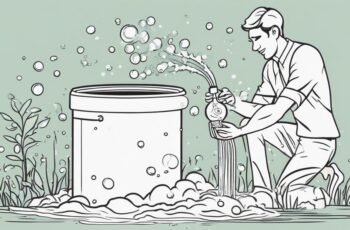Are pesky septic tank odors making your life unbearable? There's a simple solution that can keep your nose happy and your environment odor-free.
By following a few key maintenance practices, you can eliminate those unpleasant smells and enjoy a fresher atmosphere in your home. From regular pumping schedules to using septic-safe products, taking the right steps can make a world of difference.
So, are you ready to discover the secrets to preventing septic tank odors and maintaining a pleasant living space?
Key Takeaways
- Adhere to a regular pumping schedule every 3 to 5 years for odor prevention and system health.
- Implement proper waste disposal practices to avoid clogs, backups, and foul odors.
- Promptly inspect and repair leaks to control odors and prevent system malfunction.
- Use septic-safe products to maintain bacterial balance, prevent odors, and ensure system efficiency.
Regular Pumping Schedule

To maintain a septic tank system effectively, it's crucial to adhere to a regular pumping schedule. The pumping frequency is a key factor in preventing odors and ensuring the proper functioning of your septic system. Experts recommend pumping your septic tank every 3 to 5 years, depending on the size of your household and the usage of water. By sticking to this schedule, you can prevent solid waste buildup, which can lead to unpleasant odors emanating from your tank.
Regular pumping not only helps in odor prevention but also avoids costly repairs and prolongs the life of your septic system. When the tank reaches its capacity, it can no longer effectively separate solids from liquids, leading to potential backups and foul smells. By maintaining a consistent pumping schedule, you can ensure that your septic system operates efficiently and odor-free. Remember, a little maintenance goes a long way in preserving the health and longevity of your septic tank.
Proper Waste Disposal Methods
Proper waste disposal methods play a critical role in maintaining the functionality and longevity of your septic tank system. Effective waste management is essential to prevent clogs, backups, and foul odors in your system. To ensure optimal performance, avoid disposing of non-biodegradable items such as plastic, paper towels, or chemicals down your drains. These substances can disrupt the natural breakdown process within the septic tank, leading to costly issues and environmental impact.
When it comes to waste management, consider implementing a composting system for organic kitchen waste instead of using garbage disposals. This practice not only reduces the load on your septic system but also benefits the environment by producing nutrient-rich compost for your garden. Additionally, be mindful of the products you use, opting for septic-safe toilet paper and cleaning agents to maintain a healthy balance of bacteria in the tank.
Inspect and Repair Leaks Promptly

Inspecting and promptly repairing any leaks in your septic tank system is crucial for preventing further damage and maintaining effective functionality. Leak detection should be conducted regularly to catch any issues early on. Here are some key points to consider:
- Regular Inspections: Perform routine checks for any signs of leaks such as damp areas, unusually lush grass, or foul odors around the tank.
- Prompt Repairs: Address any leaks immediately to prevent them from worsening and causing more extensive damage.
- Sealant Application: Use appropriate sealants to fix minor leaks and prevent odors from escaping.
- Professional Assistance: Seek help from septic system experts if you're unsure about how to repair a leak effectively.
- Odor Control: Remember that repairing leaks not only prevents further damage but also helps in controlling unpleasant odors that can arise from a malfunctioning system.
Use Septic-Safe Products
Consider utilizing septic-safe products to maintain the optimal functioning of your septic tank system and minimize the risk of issues arising. Using eco-friendly alternatives can significantly reduce the impact of harsh chemicals on your septic system, promoting a healthier environment overall. Opt for biodegradable soaps, detergents, and cleaning agents to prevent harmful chemical buildup in the tank. These products break down more easily, reducing the load on your septic system and aiding in odor control techniques.
When selecting septic-safe products, look for labels that specifically indicate their compatibility with septic systems. Avoid items containing bleach, ammonia, or antibacterial agents, as these can disrupt the natural balance within the tank and hinder the decomposition process. Instead, choose products that are labeled as safe for septic systems and the environment. By making informed choices about the products you use in your household, you can actively contribute to the longevity and efficiency of your septic tank while minimizing the risk of unpleasant odors.
Conclusion
To keep septic tank odors at bay, it is important to follow a regular pumping schedule, dispose of waste properly, promptly repair any leaks, and use septic-safe products. By adhering to these maintenance steps, you can ensure that your septic system functions efficiently and remains odor-free.
Remember, prevention is key in maintaining a healthy and odor-free septic tank. Stay on top of these maintenance tasks to avoid any unpleasant surprises in the future.

